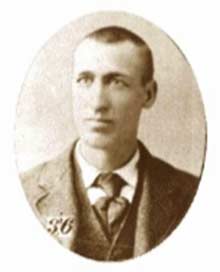Casey Jones
|
Jonathon Luther "Casey" Jones The Brave Engineer |
|
|---|---|

Portrait of the "brave engineer": John Luther "Casey" Jones, 1863–1900
|
|
| Born |
Jonathon Luther Jones March 14, 1863, Missouri |
| Died | April 30, 1900 (aged 37) Vaughan, Mississippi |
| Other names | "John"/"Casey" Jones |
| Occupation | Locomotive Engineer, railroad worker |
| Years active | 1878–1900 |
| Known for | Heroic sacrifice for refusal to abandon post to ensure the safety of passengers from an inevitable collision |
Jonathan Luther "John" "Casey" Jones (March 14, 1863 – April 30, 1900) from Jackson, Tennessee, was an American railroader who worked for the Illinois Central Railroad (IC). He was killed on April 30, 1900 when his train collided with a stalled freight train near Vaughan, Mississippi. His dramatic death while trying to stop his train and save the lives of his passengers made him a hero; he was immortalized in a popular ballad sung by his friend Wallace Saunders, an African-American engine wiper for the IC.
As a boy, he lived near Cayce, Kentucky, where he acquired the nickname of "Cayce", which he chose to spell as "Casey".
Jones married Mary Joanna ("Janie") Brady (born 1866), whose father owned the boarding house where Jones was staying. Since she was Catholic, he decided to convert and was baptized on November 11, 1886 at St. Bridget's Catholic Church in Whistler, Alabama, to please her. They were married at St. Mary's Catholic Church in Jackson on November 25, 1886. They bought a house at 211 West Chester Street in Jackson, where they raised their three children. By all accounts he was a devoted family man and teetotaler.
Jones went to work for the Mobile & Ohio Railroad and performed well and was promoted to brakeman on the Columbus, Kentucky to Jackson, Tennessee route, and then to fireman on the Jackson, Tennessee to Mobile, Alabama route.
In summer 1887 a yellow fever epidemic struck many train crews on the neighboring Illinois Central Railroad (IC), providing an unexpected opportunity for faster promotion of firemen on that line. On March 1, 1888, Jones switched to IC, firing a freight locomotive between Jackson, Tennessee and Water Valley, Mississippi.
...
Wikipedia
